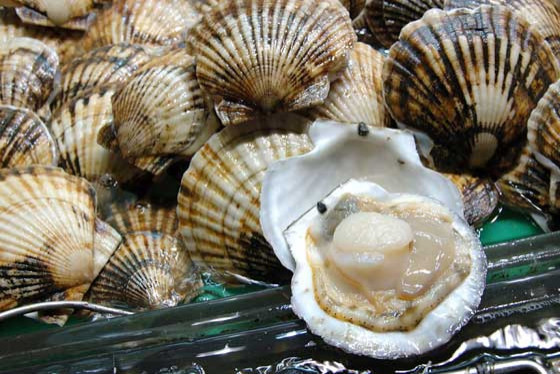Scallops War? British And French Fishermen Fight Over Dwindling Stock

Britain and France have not fought a war against each other since the so-called "Second Hundred Years' War" ended with the Battle of Waterloo in 1815, which spelled the end of Napoleon.
However, fishermen from both countries have continued to wage a much smaller-scale ‘war’ of sorts over territorial waters between the two ancient countries.
In the most recent “flare-up” earlier this week, a British fishing boat captain hunting for scallop beds claimed that his vessel was surrounded by up to eight French boats in waters about 15 miles from the French coast. He even alleged that the Frenchmen “attacked” his craft with rocks in an effort to damage the propellers and engine and called for protection from the UK Royal Navy and Coast Guard.
According to Britain’s Transport Minister Norman Baker, reports indicate that up to a total of 40 French boats surrounded five British vessels that “appeared to be fishing legally,” albeit in French waters.
"I called other vessels for assistance and when they arrived they had ropes fired at them too, and nets and ropes were put in the water to disable us," said Kevin Lochrane, skipper of the British Vertrouwen vessel, according to BBC.
"I've been at sea for 20 years and never seen anything like it. Our worry is if this all kicks off again then we're not getting any help from anybody. Maybe we could have our own naval vessel to assist us if this should ever happen again."
Lochrane also claimed that a French naval vessel in the vicinity refused to intervene.
An English fisherman from Devon named Clinton Powell told BBC: "Something has got to be done and we need naval protection."
Another aggrieved Briton, Anton Bailey, from Brixham in Devon, said French crew members "threw rocks and tried to ram us."
"This was extremely dangerous behavior -- there could have been a collision and a boat could have been sunk,” said Andrew McLeod, owner of one of the British boats that was allegedly attacked.
According to some reports, at one point, some French fishermen actually boarded a British vessel, before departing.
Lochrane lamented to the Guardian: "We were like sitting ducks. Someone could have been killed."
Richard Benyon, the British Fisheries minister, defended the rights of English fishermen.
"UK vessels have a legitimate right to fish in these waters, and France must continue to provide adequate protection to UK fishermen,” he said.
"We are monitoring the situation and will continue to keep an open dialog with our French counterparts."
However, French fishermen allege that their British counterparts are illegally over-fishing in waters that belong to France.
"It's robbery,” a French fisherman named Claude Millinaire told France’s television station TF3.
“We work intelligently to preserve fish stocks. We leave them to grow during the summer and then it's others who come and reap the benefits. We are not OK with that."
Millianire warned that Frenchmen will take further action to prevent British vessels from encroaching on "their" waters.
'Enough is enough,” he said. “We are going to step up our action. Instead of 40 boats, we will be 120. We have nothing to lose. Now we are going to have to fight to defend our livelihood. Our English friends are pillaging. They have told us that they have no intention of leaving the area.'
According to EU maritime laws, British ships can fish in areas outside of a 12-mile limit from the French shore (Captain Lochrane said his vessel was about 15 miles from shore).
The larger issue is that French and British fishermen (regardless of the legality of fishing in and out of territorial waters) are fighting over a dwindling stock of fish. Moreover, under EU quota rules, fishing boats are restricted with respect to how many days they are allowed to patrol waters for their catch.
Some in France want a ban on all fishing in parts of the English Channel to save the stock.
According to the Daily Mail, Paul Francoise, of the Calvados Fishing Committee, said: "We appealed to the French government to stop all fishing vessels – French and British – from entering the Seine Bay, but they said it was impossible. There will be further action. This will certainly mean strikes and blockades. The government must take notice.”
Last month, the London-based think-tank New Economics Foundation called for suspending fishing all across Europe, saying a freeze of five years would bring back fishing stocks to sustainable levels. Reportedly, 75 percent of stocks in European waters are overfished and catches have dropped significantly over the past 20 years.
“Continued overfishing is bad for European economies,” said Aniol Esteban, head of Environmental Economics at NEF. “Restoring fish stocks means more jobs, more income for coastal communities, and less industry reliance on subsidies from taxpayers. It makes perfect economic and environmental sense.”
© Copyright IBTimes 2025. All rights reserved.





















